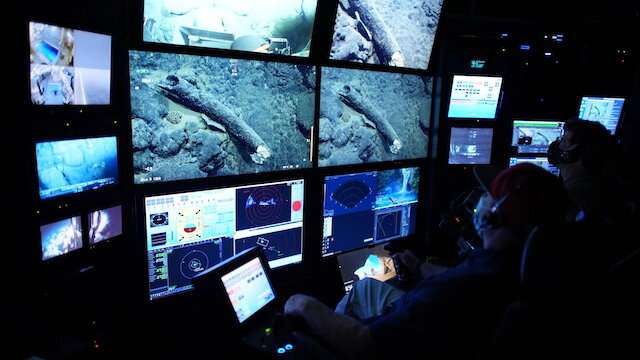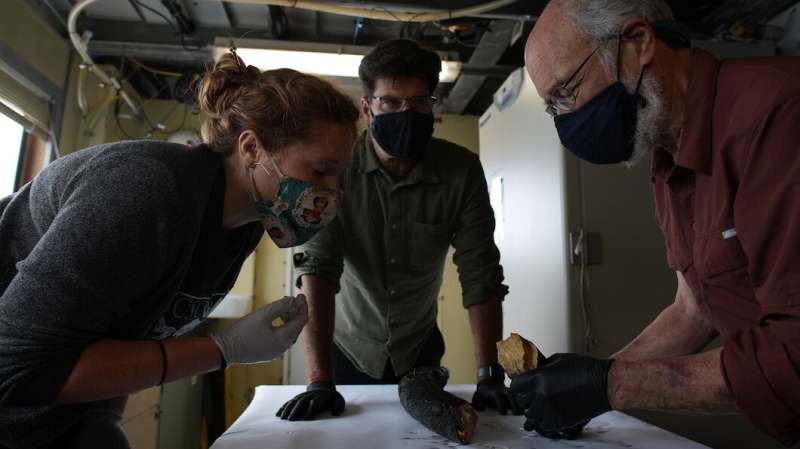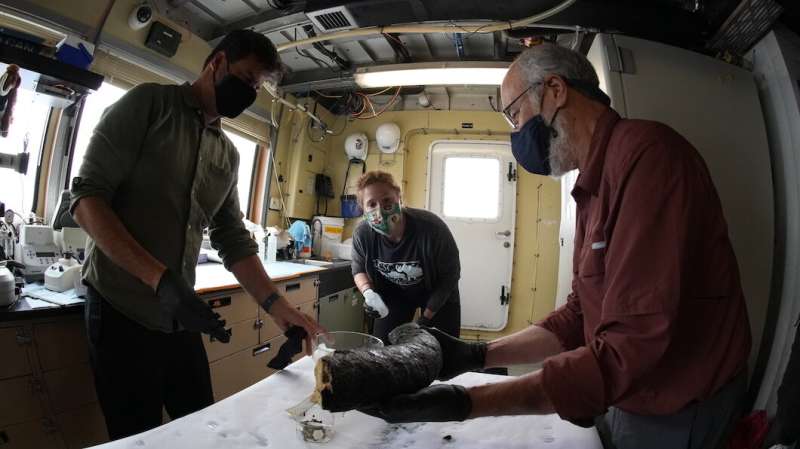Researchers recover ancient mammoth tusk during deep-sea expedition

The ocean's dark depths hold many secrets. For more than three decades, MBARI has been exploring the deep waters off the coast of central California. During an expedition aboard the R/V Western Flyer in 2019, ROV pilot Randy Prickett and scientist Steven Haddock made a peculiar observation.
While exploring a seamount located 300 kilometers (185 miles) offshore of California and 3,070 meters (10,000 feet) deep, the team spotted what looked like an elephant's tusk. Only able to collect a small piece at the time, MBARI returned in July 2021 to retrieve the complete specimen. Now, Haddock and researchers from the Paleogenomics Lab, UC Santa Cruz Genomics Institute, and the Department of Earth and Planetary Sciences at the University of California, Santa Cruz (UCSC), and the Museum of Paleontology at the University of Michigan (U-M) are examining the tusk.
The researchers have confirmed that the tusk—about one meter (just over three feet) in length—is from a Columbian mammoth (Mammuthus columbi). The cold, high-pressure environment of the deep sea uniquely preserved the tusk, giving researchers the opportunity to study it in greater detail. Computed tomography (CT) scans will reveal the full three-dimensional internal structure of the tusk and more information about the animal's history, such as its age.

The team believes it could be the oldest well-preserved mammoth tusk recovered from this region of North America. Researchers hope to sequence the ancient DNA embedded in the specimen, which could provide valuable insight about how mammoths colonized North America.
"You start to 'expect the unexpected' when exploring the deep sea, but I'm still stunned that we came upon the ancient tusk of a mammoth," said Haddock. "We are grateful to have a multidisciplinary team analyzing this remarkable specimen, including a geochronologist, oceanographers, and paleogenomicists from UCSC; and paleontologists at the University of Michigan. Our work examining this exciting discovery is just beginning and we look forward to sharing more information in the future."
"This specimen's deep-sea preservational environment is different from almost anything we have seen elsewhere," said University of Michigan paleontologist Daniel Fisher, who specializes in the study of mammoths and mastodons. "Other mammoths have been retrieved from the ocean, but generally not from depths of more than a few tens of meters."

Fisher and his U-M Museum of Paleontology colleagues will use their knowledge of the structure and composition of mammoth tusks to analyze CT scans of the specimen. The other members of the U-M team are Adam N. Rountrey, Michael D. Cherney, Ethan A. Shirley, and Scott G. Beld.
A team of researchers from UCSC's Department of Earth and Planetary Sciences will examine when and how the tusk may have arrived deep offshore. Terrence Blackburn, who specializes in geochronology, will study the mineral crusts on the tusk to determine when it landed on the deep seafloor, while Christopher Edwards and Patrick Drake will examine the oceanographic currents to better pinpoint where the tusk originally came from. Katie Moon and Beth Shapiro from the Paleogenetics Lab and the UC Santa Cruz Genomics Institute at UCSC will extract and sequence DNA from the tusk to learn about its lineage and the evolution of mammoths in North America.
The ocean represents 99 percent of the space where life can exist on this planet and yet we still know very little about it. As interest in exploiting the deep sea by mining for valuable metals has grown—with the potential to place many marine animals in harm's way—this surprising discovery, hidden on the seafloor for eons, serves as a fragile reminder of the many remaining mysteries worthy of our protection.'Well-preserved' rare mammoth skull unearthed in Channel Islands puzzles scientistsProvided by Monterey Bay Aquarium Research Institute
 A page of the Einstein-Besso manuscript is displayed at Christie's in Paris. Photograph: Chesnot/Getty Images
A page of the Einstein-Besso manuscript is displayed at Christie's in Paris. Photograph: Chesnot/Getty Images












